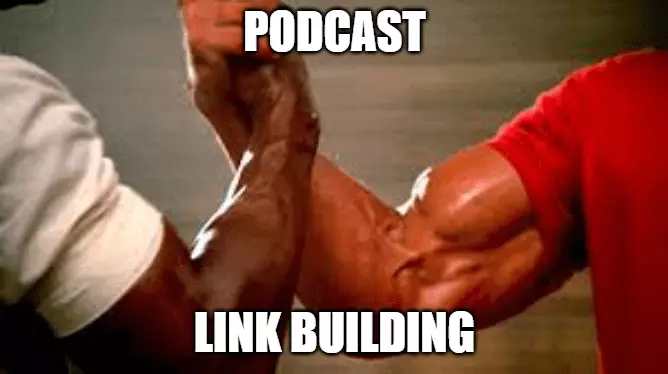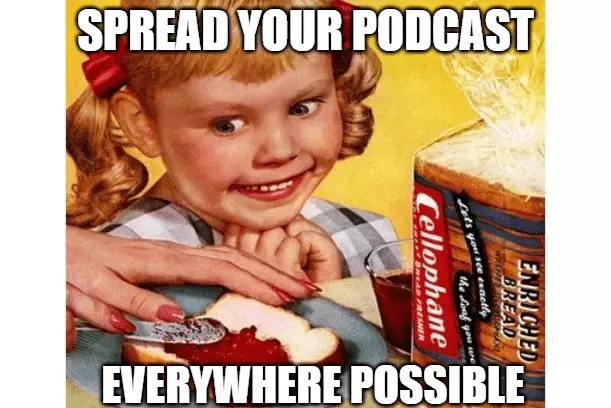This article is a guest post by Craig Hewitt from Castos. Castos is a podcast hosting platform that helps you grow your audience through public podcasts and offer exclusive content through private podcasts.
The foundation of a great link-building campaign is a solid piece of content for other websites to link to. If your content is poor, you’re going to have a hard time finding quality backlinks.
Blogging is the general approach for this, but if you want to score a lot of backlinks, you have to be exceptional. That means showing your backlink candidates something fresh; something they don’t see every day.

Podcasting is a popular way to create engaging content that other sites like to link to. You can supercharge the results of your link-building by offering podcast episodes as link targets rather than standard blog posts.
In this article, we’re going to explain why podcasting opens up link-building opportunities. Then we’ll cover the basic strategy and explain how to start your own podcast.
How Podcasts Provide Opportunities For Backlinks
The power of podcasts isn’t limited to their audience, and diversifying content is more important than you can imagine. Podcasts are social proof that you are an authoritative figure.
Whether you host a podcast or get yourself invited to a podcast show, you can attract backlinks both ways by promoting your content to a vast audience. It’s among the few SEO strategies you can leverage to build valuable relationships with influential people in your niche. Also, hosting podcasts can help you build more trust and authority faster than articles.

Having a successful blog makes you credible and successful when you approach other websites for your link-building campaigns. While it’s possible to link directly to your homepage, other sites prefer to link to pages that provide their users more value, which is typically a high-quality, content-heavy page on your site.
Podcasting can extend your brand’s reach even further. A podcast allows you to build out content across an entirely new channel and audience so you always have something valuable worth linking to. It provides other sites with an opportunity to integrate new kinds of content into their posts. They can link to your podcast posts and even embed your podcast player on their page.
(Note: Embedding a podcast player into their site won’t necessarily create a backlink, so it’s important to specifically request a text link as well.)
Other Benefits of Podcasting
But isn’t podcasting a niche? Absolutely not! According to Nielsen, 50% of all homes are podcast fans. As of 2021, there are over two million podcasts and more than 48 million podcast episodes.
Additionally, the benefits of podcasting extend beyond your link-building campaigns.
- Organizations getting asked for links for content might preferer Podcasting.
- Leverage the outreach capabilities of the big podcast hosting sites: Apple Podcasts, Google Podcasts, Spotify, and others.
- Podcast promotion on directories attracts massive audiences.
- Promote your brand by getting yourself invited to popular podcasts.
- Podcast episodes require less time than producing an article.
The Podcast Backlink Strategy
Now that you understand why podcasting is a great way to capture more backlinks, let’s talk about the actual strategy. First, you’ll need to pick a compelling topic, then add a podcast section to your website, and finally, incorporate your podcast pages into your link-building campaigns.
Step 1: Choose The Right Podcast Topic
Before starting your podcast, think about the companies and industries that you want to collect backlinks from. It’s important to design podcast episodes that
1) Fit into their current content plan, and
2) Appeal to their visitors.
For instance, let’s say you want backlinks from websites that focus on local business marketing. It would be smart, therefore, to create podcast content that helps small, local businesses grow. Instead of interviewing marketing experts, you might interview local business owners to unpack how they successfully grew their business.

Alternatively, you could choose a broad podcast topic, and then create individual episodes that appeal to backlink candidates. This exponentially increases the number of sites that would reasonably link back to you.
For instance, you might produce a show about general audience growth and create one episode that focuses on local business marketing. Then when you reach out to local marketing sites, you would offer that episode’s page for a backlink. Later, you might create an episode about Facebook marketing for when you request backlinks from Facebook marketing sites. You get the idea.

After planning your show, we recommend creating at least three episodes before you tell anybody about it. This way when a new listener discovers your content, they’ll have something to explore. In our experience, most listeners like to binge a little when they find a new content creator.
Step 2: Hosting Podcasts On Your Website
While it’s important to submit your podcast to directories like Apple Podcasts, Google Podcasts, and Spotify, it’s also important to host and publish your episodes on your podcast website. This is a key part of your link-building campaigns because it gives your backlink targets something to link to. You can host your podcast audio files on Castos, Buzzsprout, or any other platform and embed those on your website.
Functionally, a podcast website is just a regular blog, so you’re probably set up for this already. You just need a section on your site that differentiates from your standard blog posts, such as a category, tag, or custom post type.
There are multiple ways you can do that.
- Host your podcast on a subdomain of your blog Ex: podcast.xyz.com/how-to-rank-your-site
- Host podcasts on a specific URL. Ex: xyz.com/podcast/how-to-rank-your-site
- You can also embed the podcasts in the relevant articles
- Host your podcasts in a dedicated page URL or subdomain while embedding these to your articles as well.
Step 3: Podcast Prospecting
So, how are you going to research for your podcast prospecting?
First, Google search engine is a reliable resource for researching podcasts. Start your search with the “Industry + podcast” format and scrape the appearing results. This is not a very scalable process, but it works.
Your prospecting efforts should yield a commendable list of podcasters that match your link-building campaign. Obtain their contact information (particularly the email list including their name) and organize it into a spreadsheet or other similar storage method. You can subscribe to SparkToro, but it doesn’t have a dedicated cold email automation system in place for you to land an invitation.
Don’t spend endless hours identifying and qualifying each potential podcast for link building. Postaga has a dedicated podcast prospecting mechanism that finds niche-relevant podcast opportunities based on your keywords. The fun part is that it doesn’t stop there, Postaga also collects verified email addresses of the hosts to ease your outreach campaign process.
You can look for more podcasters in your niche to invite yourself to their shows. And invite them as well to your show.
That can lead to tons of branding and link-building opportunities.
Step 4: Setup Podcasting Campaigns
A load of repetitive manual work is required to identify podcasts in your niche. Manually doing things devours a serious amount of time.
What if you could automate some tasks, freeing you up to focus on what’s most important? Postaga’s cold outreach tool lets you automate most of the podcast link-building process to land more interviews in less time and without burnout. As mentioned above, Postaga automatically collects email addresses and verifies those emails while removing the bad spam traps, catch-all emails.
Once you’re done with filtering the prospects, Postaga can set up your podcast campaigns instantly with the click of a button. It also automatically sets up follow-up emails. Personalizing your campaigns can gain you a significant amount of responses.
Step 5: Add Podcast Pages To Your Link Building Campaigns
Once you have episodes published, integrate relevant episodes into your email outreach campaigns and tell your backlink candidates where you think the episode might be a good fit in their content.

Make sure to explain exactly what makes your content valuable enough to be a part of their content. For example, you might say, “This is an interview with a local business owner who tripled his customer base with an easily repeatable process.”
Point out that since this isn’t a typical blog post, their visitors will find it extra interesting. If you would like them to embed your podcast player on their page, be sure to include instructions.
If you don’t get a response, consider having an additional email in your sequence that asks someone from the organization to appear as a guest on your show. This offer could be a powerful way for starting a relationship that turns into a lucrative partnership in the future.
Step 6: Including Transcripts and Videos
The body of a podcast post should include a podcast audio player. It’s also smart to include show notes and a complete audio transcription, to help listeners enjoy the episode. We also recommend including some subscribe links so listeners can migrate to using a podcasting app.

Not everyone likes podcasts. For those, you can quickly turn your podcasts into YouTube videos with just a few clicks, then ask your backlink targets to include your video in their content.
Since 66% of people prefer to watch videos than read a text-based article, other sites would love to include some free and relevant video content. With a few tweaks, it’s easy to make your podcast available on YouTube. You can repurpose your audio content to easily create audio clips to share on YouTube shorts.
You should definitely submit your show to the big podcasting apps, but don’t link to these sites in your link-building campaigns. You want all of that valuable SEO equity to come back to your website.
How to Start a Podcast
Admittedly, podcasting has a slightly higher barrier to entry than blogging. It requires a bit more planning, some podcasting equipment, and the right podcast hosting provider.
Once you’ve chosen a topic, given your show a name, and designed some cover art, the workflow is actually quite simple:
- Brainstorm an episode topic
- Prepare for the topic
- Record the episode
- Edit the episode a bit
- Upload the audio file to your host
From that point, your podcast host does all of the heavy lifting. The host will add the episode to your RSS feed. Any podcasting app that scans your RSS URL will get the update. This video explains how the RSS feed is the linchpin of your show.
If your host offers a podcasting plugin for WordPress, you should be able to upload to your host through WordPress while making a new post at the same time. This further simplifies your workflow so you can devote more time to creating great content.
To Wrap It All Up
The key takeaway from this is to be interesting.
Your backlink targets won’t link to just anyone. They want to link to unique and interesting sites that add value to their content. Getting yourself invited to podcasts establishes your authority. Once you have enough authority you can invite your podcast guest as well.
If your content is mediocre, your link requests will get ignored in their inboxes. But if your content is exceptional, those website managers will clamor to add your links. Podcasting is a great way to create link-worthy content to serve as the foundation of your link-building campaigns.
Free 14-Day Trial
Start building relationships now with your fully-featured 14-day trial!
How We Compare
Terms | Done-For-You Terms | Privacy | Write For Us | Press
© 2024 Postaga. All Rights Reserved. Made with 
